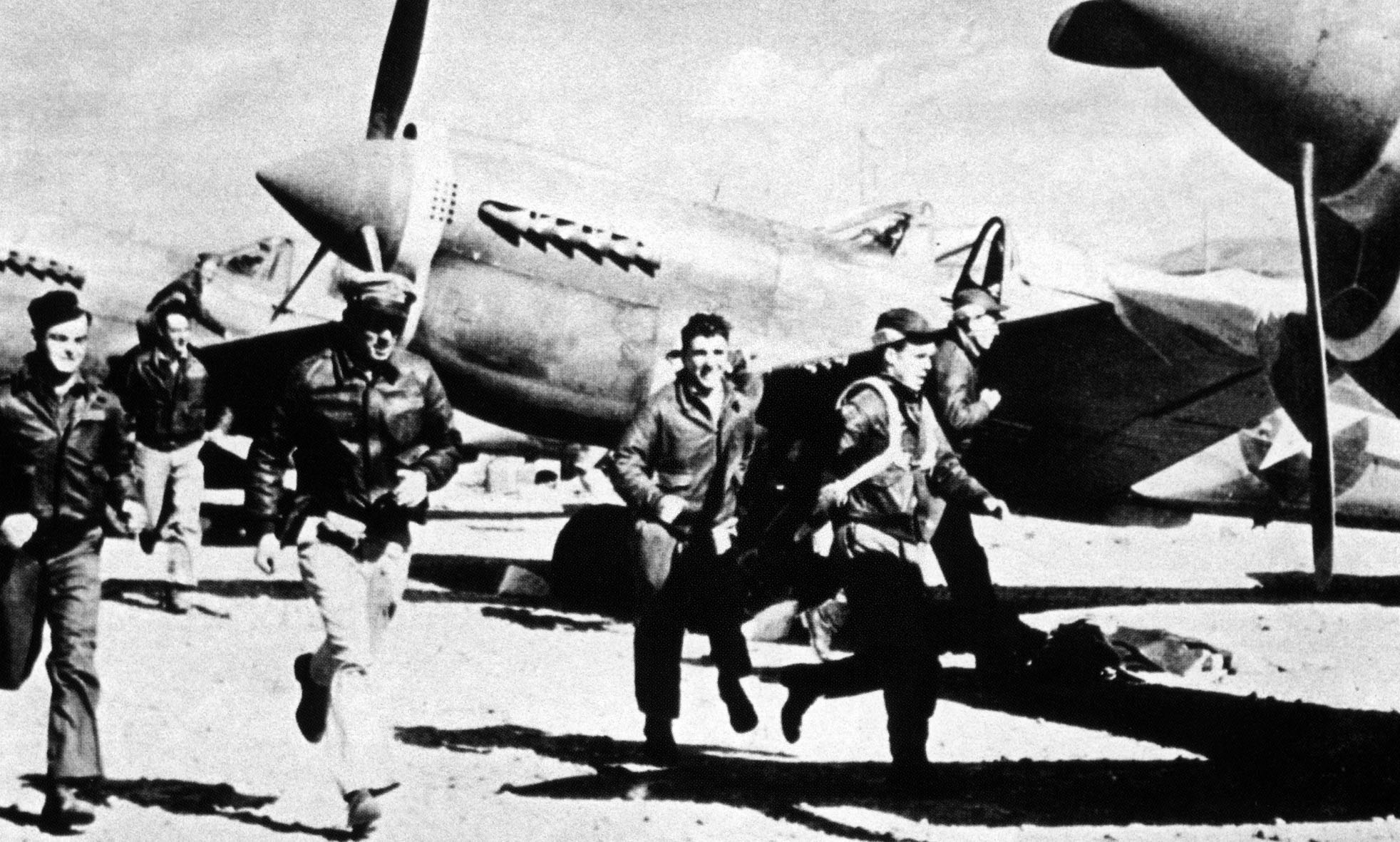 |
|
US pilots of the Flying Tigers prepare to take off at Zhijiang airport in Hunan province. The air force destroyed 297 Japanese aircraft during WWII. Provided to China Daily. |
"Seventy-four years ago, the United States and China became allies in the common cause against aggression."
So began David M. Finkelstein, an American expert on China-US military relations, in his speech themed Once, We Were Allies during a talk sponsored by the US embassy in Beijing on July 13.
Finkelstein said China and the US should find a middle ground for more cooperation based on common interests, as the two countries did during WWII in spite of existing differences.
On the heels of the 70th anniversary of the World War II victory, the US embassy in Beijing held the event to commemorate the cooperation of China and the US during the war and to discuss the two countries' future relations.
Finkelstein, a retired US Army officer, is the vice-president of the Center for Naval Analyses, one of the largest analytic groups focused on Chinese security affairs, defense policy and foreign policy in the US.
"As we approach the 70th anniversary of our allied victory, I hope you take some time to remember the years of our collaboration in our military and nation," Finkelstein said. He recalled when the US joined China's fight against Japan, which for the first time in history "the United States tied its own national security to the fate of China".
He has conducted a lot of research on WWII history, especially on the cooperation of China and the US. During the event, he tried to recollect this period of history not so well-known by people in both countries.
Japan launched its invasion of China in 1931 when the Japanese Army suddenly attacked the Chinese Army in the northeast. The historic event is known as the 918 Incident. China had fought greatly against the invasion of Japan for years until Pearl Harbor, when the US government decided to help China in 1941.
"After Pearl Harbor, the US and China became real allies," Finkelstein said. The US backed China with financial and military aid, while China provided laborers to build airfields, provide medical treatment, and other local support. China and the US formed a close bond to fight for a common objective.
Finkelstein told the story of the first and also the most famous group formed by Chinese soldiers and American volunteers: The Flying Tigers of the Chinese Air Force.
Officially named the American Voluntary Group and operating from 1941 to 1942, the Flying Tigers mainly included American volunteer pilots helping China in the far southwestern Yunnan province to defend against Japanese air forces that infiltrated from Burma. The Flying Tigers destroyed 297 enemy aircraft and about 300 enemy crews, with only 14 pilots lost in combat. The group was later awarded a Presidential Unit Citation for "professionalism, dedication to duty, and extraordinary heroism".
The exaggerated shark-faced nose art of the Flying Tigers aircraft remain among the most recognizable images of any individual combat aircraft or combat unit of World War II.
"Our soldiers lived together, fought together and died together," Finkelstein said. When American and Chinese cultures came together in the wartime conditions, they faced many problems caused by cultural differences and environmental conditions. "As I went through the records, I read many stories of how Americans and Chinese came together," Finkelstein said. "They learned to live together in the middle way."
It set an example of how to cooperate when both sides are aware of the existing differences. Finkelstein said he got two main thoughts out of the WWII history he learned. First is that when the two countries' interests come together, China and the US are capable of doing things cooperatively. "We did so in 1941, in 1972, in 1979, and now we are still working on it."
The other is that even though China and the US have the same interests, it's sometimes difficult to work with each other because of the cultural differences. "So we need to find a middle way, a balanced way and a compromising way," Finkelstein said, stressing that China and the US should do just what previous generations did during the WWII.
He said China's role in the war was critically important, not simply because it did not surrender, but also because it held up about a million enemy troops that would otherwise have been deployed to other parts of the Pacific.
China's role in WWII hasn't been appropriately understood in the West mainly because of lack of access. However, recently, it is getting more and more attention. Finkelstein suggested that China try harder to
translate the history into English, which will help the West better understand China's contribution during the WWII.
When asked about current and future China-US relations, Finkelstein said he is optimistic. But he also acknowledged it's not a simple matter, and is "a messy web of issues".
As for the upcoming US presidential election in 2016, Finkelstein predicted that there might be a change in tone or how different issues are addressed, but no major change in the administration will cause big changes to China-US relations because "America's interest in China is so enduring and constant".
He added: "I think it is the responsibility of the leaders in Beijing and Washington to make sure this stays in balance so that we can manage a positive dimension and contentious dimension of these relations."
China and the US have recently shown support for strong bilateral relations. The two countries signed two confidence-building measures when President Xi Jinping and President Barack Obama met in November.
"We have joint exercises with each other now, and we are learning to learn from each other," Finkelstein said.
Contact the writer at [email protected]